Campfire cooking is a beloved part of the outdoor experience, but keeping your cookware clean and well-maintained is crucial for both hygiene and longevity. Proper cleaning techniques not only ensure your meals taste great but also help protect the environment and your health. This article will provide essential tips and tricks for cleaning and maintaining your campfire cookware, whether you’re at a campsite or in the backcountry.
Table of Contents
- Cleaning Campfire Cookware at a Campsite
- Cleaning Campfire Cookware in the Backcountry
- Maintaining Your Campfire Cookware
- Removing Soot and Stubborn Stains
- Conclusion
- FAQ
- What temperature is considered safe for hand-washing campfire cookware?
- How can I ensure my cookware is food-safe after cleaning with natural materials?
- How frequently should I deep clean my camping cookware?
- What’s the most effective way to remove stubborn carbon buildup without damaging the cookware?
- How can I minimize my environmental impact when cleaning in areas with limited water?
- What natural alternatives can I use instead of biodegradable soap?
- How should I prepare my cookware for long-term storage between camping seasons?
- What’s the best way to restore neglected camping cookware?
Cleaning Campfire Cookware at a Campsite
Use designated washing facilities
Many campsites have sinks or washing stations specifically designed for cleaning dishes and cookware. These facilities are the most environmentally friendly option and provide access to hot running water for thorough cleaning.
Create a makeshift washing station
If your campsite lacks designated washing facilities, you can create your own using camping buckets or collapsible sinks. Fill one bucket with hot, soapy water for washing and another with clean water for rinsing. This setup allows you to clean your cookware effectively while minimizing your impact on the environment.
Use biodegradable soap
Choose a biodegradable, environmentally friendly soap to minimize the impact on the surrounding ecosystem. Avoid using harsh chemicals or bleach, which can harm wildlife and vegetation. Biodegradable soaps break down quickly and safely, reducing the risk of contamination.
Cleaning Campfire Cookware in the Backcountry
Rinse with water away from the source
When cleaning your cookware in the backcountry, rinse it with stream or lake water at least 200 feet away from the water source. This helps prevent contamination of the water source with food particles and soap residue, preserving the natural environment for wildlife and other hikers.
Use natural scrubbers
If your cookware has stubborn food residue, use sand, gravel, or grass as natural scrubbers. These materials can help remove stuck-on food without harming the environment. Simply scrub your pots and pans gently with these natural abrasives before rinsing thoroughly.
Pack out food scraps
Always carry away food scraps and dispose of them properly in a trash bag or designated waste receptacle. Leaving food waste in the backcountry can attract wildlife and disrupt the natural ecosystem. By packing out your food scraps, you help maintain the pristine beauty of the wilderness.
Maintaining Your Campfire Cookware
Avoid cooking sticky or burnt foods
To minimize the need for extensive cleaning, try to avoid cooking foods that are prone to sticking or burning. Use appropriate cooking techniques and temperatures to prevent food from adhering to your cookware. This will make cleaning easier and help prolong the life of your pots and pans.
Clean promptly after use
Don’t let food residue sit on your cookware for extended periods, as it can become harder to remove. Clean your pots and pans as soon as possible after each meal to prevent buildup. This will make the cleaning process more efficient and prevent stubborn stains from setting in.
Store in a dry place
After cleaning and drying your cookware, store it in a dry place to prevent rust and corrosion. Use a designated storage bag or container to keep your cookware protected from the elements. This will help ensure your pots and pans remain in good condition for future camping trips.
Removing Soot and Stubborn Stains
Create a baking soda paste
For stubborn soot or stains, create a paste using baking soda and water. Apply the paste to the affected areas and let it sit for a few minutes before gently scrubbing. The baking soda will help lift the stains and remove any odors, leaving your cookware clean and fresh.
Use a chain mail scrubber
Chain mail scrubbers are effective for removing stuck-on food and stains without damaging the cookware. Gently scrub the surface of your pots and pans with a chain mail scrubber to restore their cleanliness. These scrubbers are particularly useful for cast iron cookware, as they won’t remove the seasoning.
Conclusion
Cleaning and maintaining your campfire cookware is essential for enjoying delicious meals in the great outdoors while also protecting the environment and your health. By following these tips and tricks, you can keep your pots and pans in top condition, whether you’re at a campsite or in the backcountry.
Remember to use environmentally friendly cleaning methods, clean promptly after each use, and store your cookware properly to ensure it lasts for many adventures to come. With well-maintained campfire cooking equipment, you’ll be ready to whip up delicious Dutch oven baking recipes and other campfire favorites on your next outdoor excursion.
FAQ
Here’s a supplementary FAQ addressing questions readers may have after reading the article about campfire cookware maintenance. These answers provide additional insights and practical tips beyond the original content.
What temperature is considered safe for hand-washing campfire cookware?
Heat water until it’s steamy but not scalding – you should be able to comfortably hold your hand in it for a few seconds. If heating water over the campfire, let it cool slightly before washing to prevent burns and protect your cookware from thermal shock.
How can I ensure my cookware is food-safe after cleaning with natural materials?
After using natural scrubbers like sand or pine needles, heat your cleaned cookware over the fire for 30-45 seconds to sanitize the surface. Let it cool completely before storing to prevent moisture accumulation.
How frequently should I deep clean my camping cookware?
Perform a thorough cleaning after every 3-4 camping trips, focusing on removing built-up carbon deposits and checking for signs of wear. For frequently used items, inspect seams and handles monthly for loose rivets or potential repair needs.
What’s the most effective way to remove stubborn carbon buildup without damaging the cookware?
Create a paste using wood ash and a small amount of water. The alkaline properties of wood ash help break down carbon deposits naturally. Apply the paste, let it sit for 10 minutes, then scrub gently with a soft cloth. This method is particularly effective for aluminum and stainless steel cookware.
How can I minimize my environmental impact when cleaning in areas with limited water?
Pre-clean cookware with paper towels to remove excess food and grease before washing. This significantly reduces the amount of water needed and minimizes food particles entering the ecosystem. Save the paper towels with your trash to pack out.
What natural alternatives can I use instead of biodegradable soap?
Wood ash serves as an effective natural cleanser for greasy pots. For non-greasy items, hot water and pine needles can provide antibacterial cleaning properties. These alternatives leave no chemical trace and are completely safe for the environment.
How should I prepare my cookware for long-term storage between camping seasons?
Clean thoroughly and dry completely. For metal cookware, apply a thin layer of food-grade mineral oil to prevent oxidation. Store in a breathable canvas bag with moisture-absorbing silica gel packets. Check periodically for any signs of rust or corrosion.
What’s the best way to restore neglected camping cookware?
Start with a thorough cleaning using a paste of baking soda and vinegar to remove rust and oxidation. For severe cases, soak in a solution of equal parts white vinegar and water for 4-6 hours. After cleaning, season immediately with high-smoke-point oil and heat until polymerized.
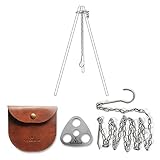


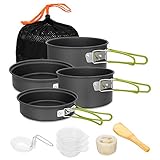




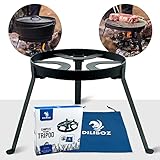


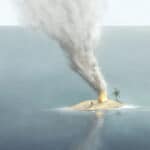
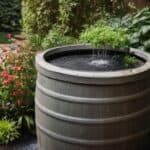
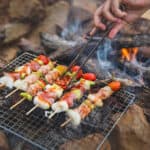






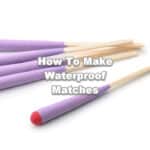

Leave a Reply